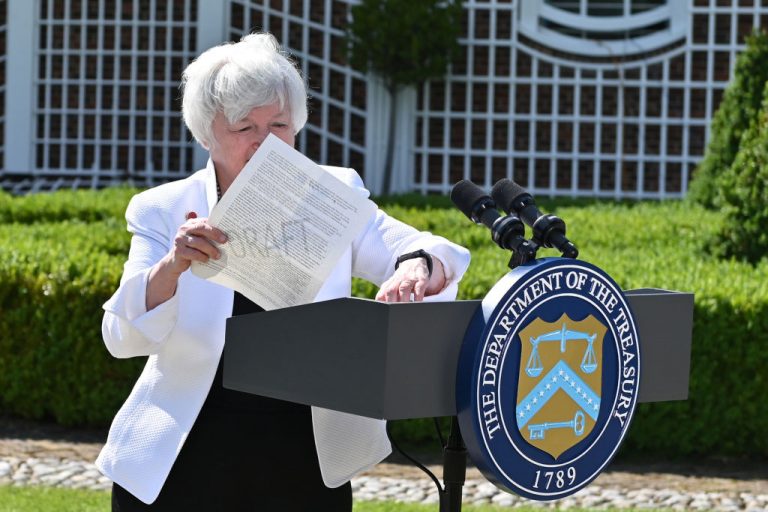Finance Ministers from the wealthy G7 nations announced on June 5 support for an international corporate tax rate of at least 15 percent backed by a global, U.S.-sponsored proposal for deterring global corporate and Big Tech tax avoidance.
The move will seek to substantiate President Joe Biden’s original plan to raise levies on U.S. companies from 21 to 28 percent to pay for his $6 trillion trio of socialist-style spending bills.
The two-day meeting took place in London with Finance ministers of the G7 nations. The group of 7 allies includes Canada, France, Germany, Italy, Japan, the UK, and the United States. An official statement stated that the group “commits to a global minimum tax of at least 15 percent on a country by country basis.”
U.S. Treasury Secretary Janet Yellen hailed what she called an “unprecedented commitment,” stating that a global minimum tax “would end the race to the bottom in corporate taxation.” Yellen added that the minimum tax agreement would “help the global economy thrive by leveling the playing field for businesses and encouraging countries to compete on positive bases.”
Italian Finance Minister Daniele Franco said he would hold more discussions concerning the tax plan when G20 finance executives meet in Venice in July, according to Bloomberg.
Success
You are now signed up for our newsletter
Success
Check your email to complete sign up
The G20 has promised to continue to offer support to “the poorest and most vulnerable countries as they address health and economic challenges associated with COVID-19.”
Huge support from Facebook for the corporate tax hike
Facebook also has proved to be a huge supporter of the move regardless of the prospect of having to pay more tax. Nick Clegg, Vice President of Global Affairs, tweeted that the company wanted “the international tax reform process to succeed and recognize this could mean…paying more tax, and in different places.”
According to press information released after the meeting, Britain’s Treasury said that “the largest and most profitable multinationals will be required to pay tax in the countries where they operate — and not just where they have their headquarters.”
British Chancellor Rishi Sunak expressed satisfaction at what he called “a historic agreement to reform the global tax system,” saying the G7 had made the system “fit for the global digital age.” Sunak thanked his counterparts for clinching “a deal of historic significance.”
Significant reservations
Notwithstanding, the push for a 15 percent global minimum could still fail. Organization for Economic Cooperation and Development representatives still have to solve contention from low-tax governments. Ireland, which has a corporate tax rate of only 12.5 percent, has expressed reservations about the G7’s plan. Hungary is even lower at 9%.
Dublin’s Finance Ministry said in a statement last month said the country actually risks losing 2 billion Euros annually if a tax hike is enacted.
Yellen claimed instead that, “The post-pandemic world must be fairer in particular with regard to international taxation.”
But for a country such as Hungary, such a policy will prove a setback as the country attracts corporations through its low tax rate and “will lose their advantage over countries that are not on the path to tax cuts,” the Finance Ministry said in a news release titled Joe Biden Would Raise Taxes With Us Too.
On Monday, Rep. Kevin Brady (R-TX) said that President Joe Biden’s tax rates on companies and the wealthy are nonstarters.
“I’m not sure we should be compromising by making America dramatically less competitive than our global competitors,” he said on CNBC’s Squawk Box.
Raising the corporate tax rate alone “makes America nearly dead last competitively and will drive jobs overseas, so I’m not sure we should be compromising by making America dramatically less competitive than our global competitors,” he said.
On June 5, former President Trump criticized Democrats at the North Carolina Republican State Convention held in Greenville for “attempting to pass” the largest tax hike in American history, saying that the move will affect every American citizen. Trump warned that the rich will simply go to other countries and several companies will also move operations to other nations to escape high taxes.


















